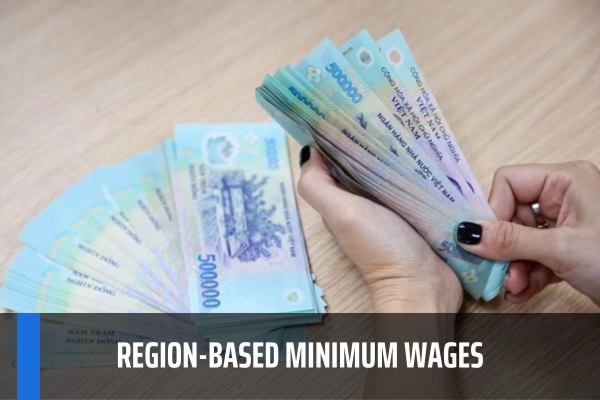Will the region-based minimum wages increase according to Resolution 27 from July 1, 2024? What are the current region-based minimum wages in Vietnam?
To increase the region-based minimum wages in 2024: When is it proposed to increase?
Pursuant to Section 2 of Resolution 27-NQ/TW of 2018, there is a roadmap and content of salary reform for the region-based minimum wages as follows:
- From 2021, the State periodically adjusts the region-based minimum wages based on recommendations of the National Wage Council.
- Continue to perfect the policy on monthly region-based minimum wages; Supplement regulations on hourly region-based minimum wages to improve minimum wage coverage and meet the flexibility of the labor market.
- Adjust the region-based minimum wages to ensure the minimum living standard of workers and their families, in relation to factors of the labor market and socio-economic development (supply - labor demand, economic growth rate, consumer price index, labor productivity, employment, unemployment, solvency of businesses...).
On the other hand, at the 8th Conference of the 13th Party Central Committee taking place on October 2, 2023, it was mentioned that implementing salary policy reform and implementing a new salary regime is inevitable and important that needs to be discussed and clarified. In addition, the implementation of salary reform will take place from July 1, 2024.
Thus, there is currently no official information about increasing the region-based minimum wages in 2024. However, after salary reform, it is possible that the region-based minimum wages in 2024 will be adjusted to ensure the minimum living standard of employees.

Is it correct to increase the region-based minimum wages according to Resolution 27 from July 1, 2024? What is the current region-based minimum wages?
What are the current region-based minimum wages in Vietnam?
Pursuant to the provisions of Article 3 of Decree 38/2022/ND-CP, the current region-based minimum wages is as follows:
Region | Region-based minimum wages per month (Unit: VND/month) | Region-based minimum wages per hour (Unit: VND/hour) |
Region I | 4.680.000 | 22.500 |
Region II | 4.160.000 | 20.000 |
Region III | 3.640.000 | 17.500 |
Region IV | 3.250.000 | 15.600 |
What is the guiding perspective on salary reform in Vietnam?
In Resolution 27-NQ/TW of 2018, the viewpoints guiding salary reform are mentioned as follows:
- Salary policy is a particularly important policy of the socio-economic policy system. Wages must truly be the main source of income to ensure the lives of workers and their families; Paying wages correctly is an investment in human resource development, creating motivation to improve labor productivity and work efficiency of workers, making an important contribution to achieving social progress and justice, and ensuring stability. socio-political; promote and improve the quality of growth and sustainable development.
- Salary policy reform must ensure comprehensiveness, systematicity, synchronization, inheritance and promotion of advantages, and effectively overcome limitations and inadequacies of the current salary policy; comply with the principle of distribution according to labor and the objective laws of the market economy, taking increased labor productivity as the basis for increasing wages; meet international integration requirements; have a roadmap suitable to the socio-economic development conditions and resources of the country.
- In the public sector, the State pays salaries to officials, public employees and the armed forces according to their employment positions, titles and leadership positions, in accordance with the State's resources and civil revenue sources. public service industry, ensuring a reasonable correlation with wages in the labor market; Implement a worthy remuneration and reward regime based on labor productivity, creating motivation to improve quality, work efficiency, public service ethics, professional ethics, contributing to cleanliness and improving effectiveness, the performance of the political system.
- In the business sector, wages are the price of labor, formed on the basis of agreements between employees and employers according to a market mechanism under the management of the State. The state regulates the minimum wage as the lowest floor to protect vulnerable workers, and is also one of the bases for negotiating wages and regulating the labor market. Salary distribution is based on labor results and production and business efficiency, ensuring harmonious, stable and progressive labor relationships in the enterprise.
- Salary policy reform is an objective requirement, an important task, requiring high political determination in building a socialist rule-of-law state and perfecting socially-oriented market economy institutions. tenet; promote administrative reform; innovate and streamline the political system's organizational apparatus, operate effectively and efficiently, and streamline staffing; innovate the organization and management system, improve the quality and operational efficiency of public service units.
LawNet
